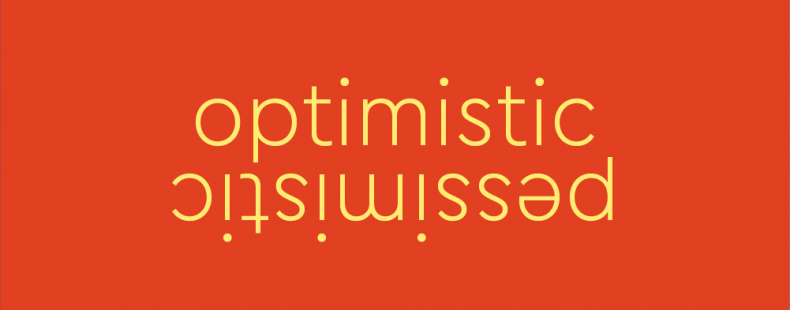Whenever Maya had bad news, she always told her mom before her dad out of fear of how he would take it. While her mom was able to make her feel better about a situation, her dad jumped to the worst case scenario and viewed any challenge with a negative perspective.
Does this make Maya’s mom an optimistic person and her dad a pessimistic one? Is his gloomy personality the complete opposite of his wife’s hopeful outlook? Let’s take a closer look to see what these two words mean and whether or not they’re actually antonyms.
What does optimistic mean?
Optimistic is an adjective that’s defined as “disposed to take a favorable view of events or conditions and to expect the most favorable outcome.” It can also refer to someone or something that “reflects a favorable view of events and conditions and the expectation of a positive outcome; demonstrating optimism.”
Optimistic can refer to a person who is hopeful about how something will turn out or describes something that has a positive or confident future outcome.
For example:
- One of the things Clara’s friends love the most about her is that she’s endlessly optimistic and always able to find the positive in even the worst situations.
- After months of layoffs and staggering unemployment rates, there’s finally an optimistic economic forecast.
- Although the players spent most of the first half of the game losing, their coach is optimistic that they can still turn it around if they focus.
Optimistic was first recorded around 1840–50 and is based on optimist, which stems from the French optimiste. Synonyms for optimistic include assured, cheerful, confident, encouraged, happy, hopeful, idealistic, keeping the faith, positive, and promising. Antonyms for optimistic include dejected, depressed, doubtful, gloomy, hopeless, pessimistic, and sorrowful.
What does pessimistic mean?
Pessimistic is an adjective that is defined as “pertaining to or characterized by pessimism or the tendency to expect only bad outcomes; gloomy; joyless; unhopeful.”
For example:
- He has such a pessimistic outlook that each time he goes to a doctor’s appointment he is terrified over what they might find.
- Although she was incredibly talented, her pessimistic mom feared she’d never have a successful singing career.
- After one failed driving test, the pessimistic teen was positive he would never get his driver’s license.
Pessimistic was first recorded around 1865–70, and it stems from pessimist, which is ultimately derived from pessimus, the Latin superlative of malus (“bad”). Synonyms for pessimistic include bleak, depressed, despairing, discouraged, gloomy, hopeless, and sad. Antonyms for pessimistic include bright, cheerful, encouraged, happy, joyful, sunny, confident, optimistic, and trusting.
How to use each
Optimistic and pessimistic are antonyms, and when it comes to people, it’s easy to see why. These two adjectives are the complete opposite. For personality types, they describe either a person who lives life filled with complete despair and hopelessness or an upbeat and positive individual who can always see the bright side in any situation.
For example:
- Although he tried not to be discouraging after her cancer diagnosis, Daniel’s pessimistic personality prevented him from being a supportive friend.
- Despite watching her mom die of breast cancer, Joy remained optimistic and refused to let her own diagnosis terrify her.
Or:
- After their nasty breakup, Amanda was completely pessimistic that she would ever find love again.
- Tony was heartbroken after Amanda left but remained optimistic that the right person for him was still out there.
Other examples include:
- During the coronavirus outbreak pessimistic shoppers stockpiled toilet paper and bottled water as they feared the worst.
- It was optimistic to think she could save enough money for a car in six months, but she worked hard trying to achieve this goal nevertheless.
- Some environmentalists have a pessimistic view of the world’s ability to mitigate global warming and fear what will happen if leaders don’t make drastic changes.
- Despite the difficulties, many teachers are trying to remain optimistic while teaching remotely for the sake of their equally stressed students.
We’re optimistic that you will master the difference in now time.
Even the closest synonyms can share some differences, and without the antagonism. Just look at homemade vs. handmade, or psychic vs. medium.














